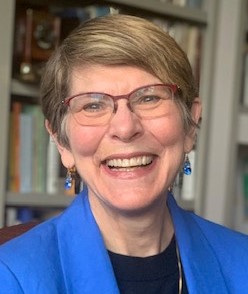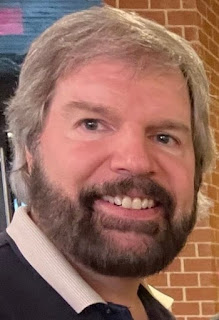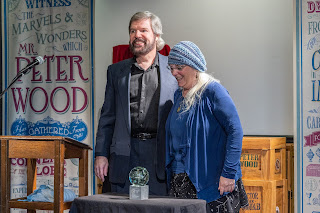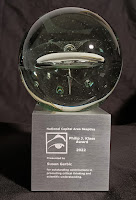December 2022
NCAS Public Lecture Series
The
"Science" of the Paranormal
Bryan
Bonner and Bob Lewis
Rocky Mountain Paranormal Research Society
Saturday, December 3, 1:30pm - 4:00pm
Central Library
Barbara M. Donnellan Auditorium
1015 North Quincy Street
Arlington, VA [map] [directions]
(Virginia Square-GMU Metro station)
FREE admission – Everyone welcome, members and non-members
Also a YouTube Live
Event with Q and A
NCASVideo YouTube Channel:
https://youtu.be/QPqu82HVwqo
For over two decades, the Rocky Mountain Paranormal Research Society has
examined a wide range of reported paranormal phenomena, including ghosts, poltergeists,
psychics, UFOs, cryptids, and much more.
Unlike others in the field, they have made sure not to run around cemeteries,
screaming and scaring the group with over‐active imaginations. From the
field to the lab, they test bizarre beliefs and practices, conduct experiments
and on‐site investigations, and re-create unusual events.
With extensive experience and training, using a collection of equipment and the
most important tool--critical thinking--they utilize stage magic, mentalism,
history, and science to seek the evidence to solve the mysteries and close the
cases.
Their work has earned the respect of believers and skeptics alike, and earned
the fear of fraudsters and charlatans.
Bob Lewis and Bryan Bonner will be joining us remotely via Zoom.
Refreshments will be available.
https://www.ncas.org/2022/11/december-3-science-of-paranormal.html
Teller on the Mend
As many of you may already know, Teller of Penn & Teller
(and 2012 NCAS Philip J. Klass Award co-laureate) underwent quadruple bypass
surgery on September 29. He's been posting updates on Twitter, starting
with
https://twitter.com/MrTeller/status/1578887304751378432
and recently
https://twitter.com/MrTeller/status/1595197669055483904
The Penn & Teller show scheduled for MGM National Harbor
on December 10 has been rescheduled for July 30, 2023.
Meanwhile, "The Tempest" has opened to rave
reviews at Round House Theatre in Bethesda. Teller is credited for
co-directing/co-adapting and magic.
https://dctheaterarts.org/2022/11/29/the-tempest-at-round-house-is-big-bold-and-magical/
https://www.metroweekly.com/2022/11/editors-pick-the-tempest-by-round-house-folger/
https://www.washingtonpost.com/theater-dance/2022/11/29/round-house-the-tempest/
A conversation with co-director/co-adapter Aaron Posner and
actor Nate Dendy:
https://www.youtube.com/watch?v=ZR6F2DD_BvA
Peter Wood Returns to "Penn & Teller: Fool Us"
Speaking of Penn & Teller, "Collector of the
Impossible" Peter Wood returned to "Penn & Teller: Fool Us"
on May 3, less than a week after entertaining NCAS members and guests at the
Klass Award event on April 27!
Here's his segment from the episode that was broadcast on
November 11:
https://www.youtube.com/watch?v=9nDAMZ6OL5s
See also Peter's videos discussing
his return to the show:
https://www.youtube.com/watch?v=4fPyHHKRr7I
https://www.youtube.com/watch?v=fxE5igZtSVQ
https://www.youtube.com/watch?v=CgzNI2WHL1Q
https://www.youtube.com/watch?v=KfDHaMtzXl0
Plus...https://www.youtube.com/watch?v=uDTcJ4cia_Q
Solar Power Beaming Experiment Returns to Earth
On November 12, the US Space Force
announced that its X-37B space plane had landed safely that morning at NASA's
Kennedy Space Center Shuttle Landing Facility. Among the many experiments
onboard during the 908-day orbital flight was the Naval Research Laboratory's
Photovoltaic Radiofrequency Antenna Module (PRAM). This experiment successfully
harnessed solar rays outside of Earth's atmosphere and aimed to transmit power
to the ground in the form of radio frequency microwave energy.
Dr. Paul Jaffe, the PRAM Principal Investigator, described
the experiment in this NRL video:
https://www.youtube.com/watch?v=NTrGFDQPHV8
See also
https://www.nrl.navy.mil/Media/News/Article/2220998/nrl-conducts-first-test-of-solar-power-satellite-hardware-in-orbit/
https://www.navy.mil/Press-Office/Press-Releases/display-pressreleases/Article/2652805/nrl-pram-mission-one-year-and-still-going/
In addition to his career as an electronics engineer,
researcher, and integration and testing section head at the Naval Center for
Space Technology at NRL, Dr. Jaffe is a lifetime member of NCAS and served as
its president from 1998 to 2003.
https://www.spaceforce.mil/News/Article/3217077/x-37b-orbital-test-vehicle-concludes-sixth-successful-mission/
Dr. Jaffe's March 2014 lecture, available on the NCAS
YouTube Channel:
https://www.youtube.com/watch?v=bTPgZwAa_1g
Follow-Up: The Wyoming Prison Freethinker
The March and April 2019 editions of Shadow of a Doubt
included the following item:
Donate Skeptical Books/DVDs to a
Prison Library
A Wyoming prison inmate recently [January 2019] wrote to NCAS (and presumably
other skeptics groups) to request science/skeptics books/DVDs for donation to
his prison's library. A librarian confirmed the details: the books must
be softcover only, and can only be donated by an organization, not by an individual.
If you'd like to participate, bring a new or used DVD or softcover book to an
NCAS event, or mail NCAS a check to cover the cost of a new book or DVD.
We'll collect donations at the April 6 lecture and ship the items to the prison
library. Some of the prisoners have low reading levels, so having some
science/skeptics books aimed at younger readers could be appropriate.
Recently I Googled the inmate who wrote to NCAS. Turns
out he was released from prison about a year ago and has a new book:
https://www.thesheridanpress.com/arts-entertainment/local-entertainment/former-wyoming-prisoner-releases-critical-thinking-book/article_ebbe3222-2b0f-11ed-a6ee-0748331ff05c.html
http://prometheusbooks.com/books/9781633887985
Prez (Re-)Sez
By Scott Snell
I don't have much more to say this month, other than
correcting/updating what I said last month! See below.
I want to thank everyone who contributed to the two
membership meetings following the September and October NCAS lectures.
The resulting list of ideas for NCAS to re-activate itself following the
pandemic is a good start and a work in progress.
I'll focus here on only one aspect: though ideally all of
our monthly lectures would be livestreamed for maximum participation, we do
have technical limitations. We can livestream a speaker who is in our
meeting room. But if our speaker is joining us remotely, only the
audience in the meeting room can participate or even watch.
That was the case for our October 8 talk about fake news
(Professor Andie Tucher, who joined us from New York), and it will also be the
case for our November 12 event with Ben Radford, joining us from New Mexico.
Our program producer, J. D. Mack, is now using additional
equipment to allow live-streaming of remote speakers, starting with the
November 12 Ben Radford event.
Almost all of our speakers allow their talks to be posted
later on the NCAS YouTube channel. But skepticism can be
much more than a spectator sport. I suppose if you think of a question or
a missed point after watching a video, you might contact the speaker directly,
or at least post below the video. I think the best situation is to be able
to pose your question to the speaker during the event, so the question and
answer will be part of the posted video. And your question may spark
other interesting questions and remarks during the event.
The absence of some of our members and guests is keenly felt
during our events now. Before the pandemic, we would get 30 to 40
attendees, sometimes more. Now we get about 20.
I realize it's an investment of time and energy, and
involves some risk. But in return, as always, we have refreshments and
camaraderie awaiting you. And we offer an opportunity to directly
interact with authors and other speakers. In comparison with the
Smithsonian Resident Associates program or events at Politics and Prose, or
"Profs and Pints," ours is a competitive service due to it being free
of charge, and due to J. D. Mack's technical capabilities of bringing remote
speakers into the room with us.
Do you have an idea for a speaker or topic? Don't let
geography limit your ideas...we'll try to get that speaker!
And we'll be generally accessible again when our lectures
will be livestreamed online only (no meeting room) during the winter months to
avoid inclement weather and a possible resurgence of COVID-19.
As an aside, I was disappointed and somewhat concerned to
hear that CSICon 2022 had no Q and A. Yes, that would allow more speakers
to participate, but first and foremost, we skeptics are questioners. The
irony of the Center for Inquiry not allowing time for inquiry at its conference
is amusing but unfortunate.
Chip Denman told me that there were opportunities at CSICon
"to interact with speakers in a more meaningful way than from a microphone
in the audience."
It's true that there are sometimes poor-quality questions,
or the questioner may be nervous and having trouble forming a concise
question. Or that an interesting concept for the speaker to consider may
be difficult to convey succinctly. And there are the inevitable
pontificators. But damn it, are we really supposed to just watch people
present and then applaud? Even the better presentations may have
interesting gaps, or an audience member has important information unavailable
to the speaker. Just on principle, I think it's the right thing to do to
allow time for good and bad questions instead of stacking speakers to fill the
time. (Though of course, some speakers may decide not to take
questions.) Imitating scientific conferences, which almost always have Q
and A segments unless the session runs long, is probably the best model for
skeptical conferences. On those occasions when a presentation is so
thorough (or inert) that no questions emerge, the next speaker can begin early.
So yes...I hope we will see you on Saturday and we'll hear
your questions!
AmazonSmile: Thanks to our members who are supporting NCAS!
When shopping at smile.amazon.com,
you'll find the same low prices, vast selection, and convenient shopping
experience as Amazon.com, with the added bonus that a portion of the purchase
price (0.5%) goes to NCAS! It's simple and automatic, and it doesn't cost you
anything!
AmazonSmile's disbursements to NCAS in the second quarter of 2022 came to
$41.83, meaning that over $8000 of purchases were designated in support of
NCAS. (As an example of how NCAS can put that money to good use, it's
more than enough to cover two hours of a Montgomery County lecture room
rental.)
Thanks again to our members who have chosen to support NCAS!
For more information:
https://smile.amazon.com/about
https://press.aboutamazon.com/news-releases/news-release-details/amazon-launches-amazonsmile-simple-automatic-way-customers
Shadow Light
Some members and contacts of NCAS receive a postal notification of this and
every new monthly Shadow of a Doubt. The Shadow Light
postcard announces the monthly lecture and highlights of the electronic Shadow
of a Doubt, which is available online at ncas.org/p/shadow.html. NCAS thereby
reduces Shadow production and postage costs. To further reduce
costs, members and contacts can opt out of postal notification altogether,
while continuing to receive Shadow of a Doubt via e-mail. To opt
out, send us an e-mail at ncas@ncas.org.
Time to Renew?
Be sure to check your renewal date above your postal address on the Shadow
Light postcard. Send any queries to ncas@ncas.org. Use
the online
membership form to renew.
https://www.ncas.org/p/shadow.html













